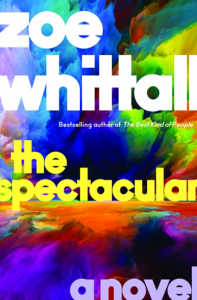
by Zoe Whittall
Harper Avenue, 359 pages.
When I finally decided not to have children, I called my mother. I asked if she knew anyone childless in her generation, and what their lives were like—because while the path toward children seemed so clear to me, the one away from them was obscure and vague. I wanted role models; I wanted to see potential in my decision, not an absence of maternal identity. (For what it’s worth, my mother didn’t really know anyone, at least not anymore.)
The beginning of Zoe Whittall’s The Spectacular, which follows three generations of women through their conflicting emotions about maternity, seems to seek out the same potential. The novel opens with the youngest family member, the early-20s Missy, begging doctors to tie her tubes before she goes on tour with her band. Although Missy is sure she will never want children, every physician refuses, certain she’ll change her mind and regret her choice. In response to one doctor, Missy snaps, “I’m going to regret a lot of things. You can’t know. What I do know is I don’t want to try to get an abortion in Kansas while my bandmates are partying.”
I admit my bias here, but this passage electrified me. People are constantly warning women that if they don’t have children, they will inevitably regret denying their biological destiny. On the one hand, this gives us no credit for understanding our bodily desires, but on the other, so what? As Missy points out, what really happens if we do regret it? Why is this decision more important than any other? Everyone has regrets in their life, there’s no reason not having children should be the most colossal.
The Spectacular questions our cultural narratives about biology in other ways, too. In fact, it queers them: Missy is around a two on the Kinsey scale; the book has a well-developed trans character; and there are probably more queer relationships than heterosexual ones throughout the narrative. Accordingly, Whittall also focuses on intimacy and child-rearing outside the nuclear family, starting with Missy’s upbringing in a commune with her mother, Carlota. Whittall does all this with nuance and without rose-coloured glasses; she doesn’t present these alter-natives as utopias, and in particular focuses on how the commune’s higher ideals devolved into traditional gender roles all the same.
Unfortunately, however, much of the book’s early promise devolves in the same way as the commune. In the last chapters, we have sped through Missy’s life and she is now in her mid-thirties. In this period, she divorces her husband because she realizes (at long last) that she does want a child, while he doesn’t. She achieves what she wants, and the final pages of the book show Missy with her little girl, Hazel, bouncing on her knees.
To be fair, Missy changing her mind isn’t the problem, though it does uncomfortably throw into question whether her early doctors were justified in their refusals. The real issue is that practically everyone in The Spectacular makes the same choice. Besides Missy’s aforementioned ex-husband, everyone in her life has children. Her old band-mates, her musician friends, her new boyfriend. Truly, everyone. She even discovers a posthumous letter from her grandmother that, with seeming earnestness on Whittall’s part, urges her to have children. For a novel so concerned with the pros and cons of motherhood, I was genuinely surprised that it couldn’t imagine a real future without children for just one of its side characters, let alone its core ones.
Obviously, I’m still biased here. When you decide not to have children, you find yourself scouring for affirmation in the remotest of places, even in your mother’s old friends, even in tertiary fictional characters. Nonetheless, as The Spectacular went on, I couldn’t help thinking that it morphed from a text curious about identity within and without motherhood into a Bildungsroman where to bear a child is a natural stage in Missy’s biological maturity. It’s an outcome I don’t think Whittall quite intended, but it’s all the more disappointing because of its carelessness. In the end, The Spectacular still unconsciously fears the absence of motherhood when it might have embraced the potential of both paths, regrets and all.
—From CNQ 110 (Fall 2021/Winter 2022)
We post only a small fraction of our content online. To get access to the best in criticism, reviews, and fiction, subscribe!
